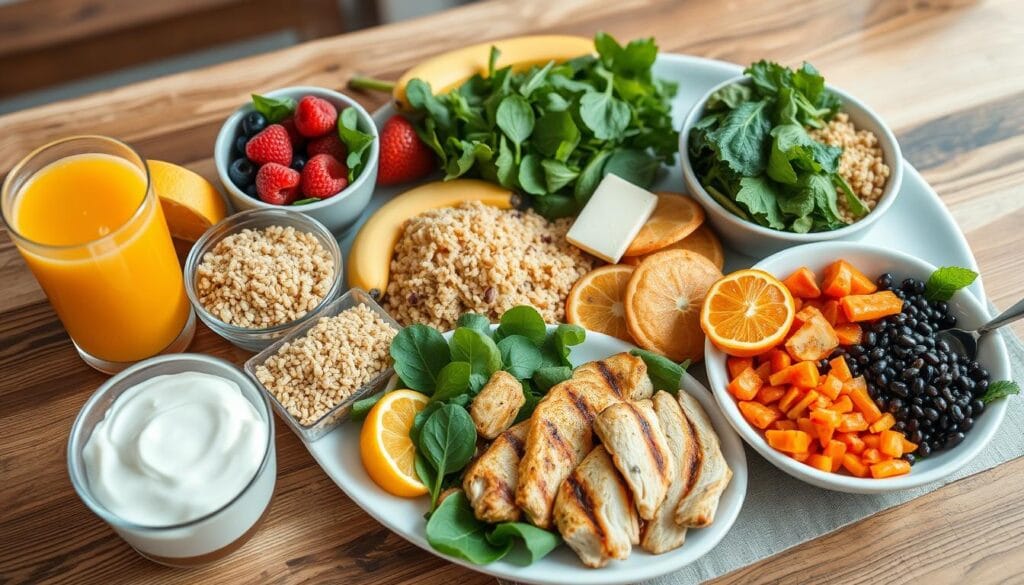Did you know your pregnancy starts on the first day of your last period? This is before you even conceive. The first two weeks are all about getting ready for ovulation and maybe getting pregnant. You might not feel any pregnancy signs yet, but knowing what’s happening is important for a healthy pregnancy.
Table of Contents
So, what’s happening in those first weeks of pregnancy? Let’s look at the timeline and important milestones. This will help you understand the early stages of this amazing journey.
Understanding Your First Week of Pregnancy Timeline
Pregnancy is an amazing journey that starts from the first day of your last period. Doctors use this day to figure out when you’re due. Even though you might not conceive right away, this timeline marks the beginning of big changes in your body for the next 40 weeks.
When Pregnancy Actually Begins
Pregnancy doesn’t start when the sperm meets the egg. The count of weeks is from the first day of your last period. This is even though the egg implants about 5-6 days after it’s fertilized.
Calculating from Last Menstrual Period
Doctors start counting from the first day of your last period to guess your due date. This method is used because finding the exact day you conceived is hard. But your last period is a clear start point.
The Conception Window
- Ovulation, when a mature egg is released, usually happens around day 14 of a 28-day cycle.
- Fertilization occurs within 24 hours of ovulation, if sperm is there.
- The conception window is short, with the egg good for 12-24 hours and sperm up to 5 days.
Knowing this timeline helps spot early pregnancy symptoms and signs in the first weeks.
Week 1 of Your Pregnancy: The Beginning
As your first week of pregnancy starts, your body is getting ready for an amazing journey. Even though there’s no embryo yet, your body is changing in ways that prepare for it. Hormonal changes and body processes are setting the stage for what’s to come.
Your uterine lining starts to shed, beginning your menstrual cycle. This is a natural step for your body to get ready for a possible pregnancy. At the same time, your ovaries start to get ready to release eggs. This is the start of fertilization and embryonic development soon.
Even though you’re not officially pregnant yet, it’s key to keep a healthy lifestyle. Taking your prenatal vitamins is also important. It helps your body get ready for a growing baby when the time comes.
“The first week of pregnancy is a time of preparation, as your body lays the groundwork for the miraculous journey of creating a new life.”
Keep an eye out for any body changes and talk to your healthcare provider about them. With the right care and preparation, you’re on your way to a healthy pregnancy.
Early Hormonal Changes and Body Preparation
As you start your pregnancy journey, your body goes through amazing changes. These changes get your body ready for the incredible process of conception and implantation. It all begins in the first week.
Follicle Stimulating Hormone (FSH) Role
The pituitary gland releases follicle stimulating hormone (FSH). This hormone is key in helping your ovaries mature eggs. As these eggs grow, they start making estrogen.
Estrogen and Luteinizing Hormone Function
Estrogen levels rise, making your uterus lining thicker. This prepares it for a fertilized egg. At the same time, the pituitary gland releases luteinizing hormone (LH). This hormone makes a mature egg leave the ovary, a process called ovulation.
Preparing for Ovulation
These hormonal changes can show up in your basal body temperature and cervical mucus. You might see your basal body temperature drop before ovulation, then rise after. You could also feel mild cramping or spotting around ovulation time.
“The hormonal symphony during the first week of pregnancy is truly remarkable, setting the stage for the incredible journey ahead.”
Signs and Symptoms in Early Pregnancy
In the first few weeks of pregnancy, you might feel different or not feel anything at all. Symptoms can vary a lot from person to person and even from one pregnancy to another. Some common early pregnancy symptoms include:
- Missed period
- Light spotting (implantation bleeding)
- Mild cramping
- Breast tenderness
- Fatigue
- Nausea
- Heightened sense of smell
- Mood changes
Many of these pregnancy symptoms can feel like premenstrual symptoms. This makes it hard to know if you’re pregnant early on. If you think you might be pregnant, it’s best to take a pregnancy test to find out for sure.
“Most people have no pregnancy symptoms at week 1, while some may experience early symptoms like fatigue, breast tenderness, and mild cramping within the first 5-6 days after intercourse.”
Implantation happens around 5-6 days after you conceive. It can cause light bleeding and cramping, which might feel like your period. Morning sickness often starts around 4 weeks into pregnancy.
Not every woman feels the same implantation symptoms or has symptoms that are as strong. It’s important to pay attention to how you feel and talk to a healthcare provider if you have any worries about your pregnancy.
Essential Nutrients and Supplements
Eating well during pregnancy is key for your baby’s growth. A good diet is the base. Prenatal supplements add extra nutrients for you and your baby.
Importance of Folic Acid
Folic acid, or vitamin B9, is very important during pregnancy. It helps prevent serious birth defects like spina bifida. You should take 600-1,000 micrograms of folic acid every day, starting before you get pregnant.
Recommended Vitamin D Intake
Vitamin D is good for bones and the immune system during pregnancy. You need 600 IU (15 micrograms) daily, especially in the darker months. Your doctor might suggest more if you’re not getting enough.
Prenatal Vitamins Guide
- Choose a prenatal vitamin with iron, calcium, and iodine.
- Stay away from too much vitamin A (retinol) in supplements.
- If you qualify, the Healthy Start scheme offers free prenatal vitamins for pregnant women and kids under 4.
Talk to your healthcare provider about the right prenatal supplements for you and your pregnancy stage.
“Proper nutrition during pregnancy is essential for the health and development of both the mother and the baby.”
Preparing Your Body for Conception
Starting to plan for a pregnancy is exciting. But first, focus on your preconception health. A few lifestyle changes can help prepare your body for a healthy pregnancy.
Eat a balanced diet rich in fruits, veggies, and whole grains. These foods give your body the vitamins and minerals it needs. Fertility tips also suggest cutting down on caffeine. Too much can make it harder to conceive and increase miscarriage risks.
- Aim for up to 3 servings of fish a week, each 4 ounces (oz), but limit your tuna intake to 1 can (85 g) of white tuna or 1 tuna steak per week, or 2 cans (170 g) of light tuna per week.
- Quit smoking and avoid alcohol to support your preconception health.
- Men should also be mindful of excessive heat exposure to their testicles, such as hot tubs or laptops on their lap, as this can affect sperm production.
Also, schedule a preconception checkup with your healthcare provider. They can check your health, talk about risks, and offer advice on pregnancy planning. This can help find any health issues and improve your fertility.
“Preconception lifestyle changes can help prevent complications during pregnancy and ensure a healthier outcome for both the mother and the baby.”
A healthy mind and body are key for conception. Manage stress, sleep well, and exercise regularly. By focusing on your well-being, you’re preparing for a successful pregnancy journey.

Understanding Ovulation and Fertilization
The ovulation cycle is key for getting pregnant. Your body changes a lot during this time, getting ready for a baby. Knowing about basal body temperature and cervical mucus helps find the best time to conceive.
Tracking Basal Body Temperature
Your basal body temperature shows when you’re ovulating. It drops a bit before ovulation and then goes up by 0.5°F (0.3°C) after. Tracking these changes helps you know when you’re most fertile.
Cervical Mucus Changes
Changes in cervical mucus also signal ovulation. Before ovulation, your mucus will be clear, stretchy, and lots, like raw egg white. This helps sperm get to the egg, boosting your chances of getting pregnant.
Optimal Timing for Conception
In a 28-day cycle, ovulation is usually around day 14. But the best time to conceive is the 5 days before and the day of ovulation. Trying every other day during this time can really up your chances.
Ovulation prediction kits can also help. They show when LH hormone spikes before ovulation. This lets you plan the best time to try for a baby.
“Conception usually happens between 12 and 24 hours after ovulation. About 25% to 30% of the time, it happens when sperm meets the egg.”
Lifestyle Changes for Early Pregnancy
Starting your pregnancy journey means making healthy changes. Eating a balanced diet with fruits, veggies, whole grains, and lean proteins is key. Drinking lots of water is also important. But, avoid raw meats, unpasteurized dairy, and high-mercury fish as they can be harmful.
Don’t overdo it with caffeine, aiming for 200mg a day or less. Exercise is good, but choose low-impact activities like walking or swimming. Always check with your doctor first. Avoid risky activities and sports that could hurt you.
Getting enough sleep and managing stress are vital. Stay away from harmful chemicals and secondhand smoke. Taking prenatal vitamins is also crucial, as your healthcare provider will tell you.
By adopting these healthy habits, you’re setting your pregnancy up for success. Remember, your body is changing a lot. Be patient, listen to what it needs, and work with your healthcare team for the best results.

“Caring for myself is not self-indulgence, it is self-preservation, and that is an act of political warfare.”
– Audre Lorde
When to Take a Pregnancy Test
Figuring out when to take a pregnancy test is both exciting and nerve-wracking. Home pregnancy tests look for human chorionic gonadotropin (hCG) in your urine. This hormone shows up when you’re pregnant. It’s best to wait until you miss your first period for the most accurate results.
Types of Pregnancy Tests
There are two main types of pregnancy tests: home urine tests and blood tests. You can do home tests by yourself, but blood tests need a visit to a doctor or lab. Both check for hCG, but blood tests can spot pregnancy sooner, often in 7-10 days after you conceive.
Accuracy and Timing
Home pregnancy tests are very accurate, with a success rate of 98-99%. It usually takes 7-10 days after you ovulate for hCG to show up in a test. For the best results, use your first morning urine and follow the test’s instructions closely.
Understanding Test Results
A positive test result, even if the line is faint, usually means you’re pregnant. False negatives happen more often than false positives. If you think you might be pregnant but the test is negative, wait a week and try again. If you keep getting negative results but still think you might be pregnant, see your healthcare provider. They can confirm the results and start your prenatal care.

1 thought on “Week 1 of Your Pregnancy: What to Know”
Comments are closed.